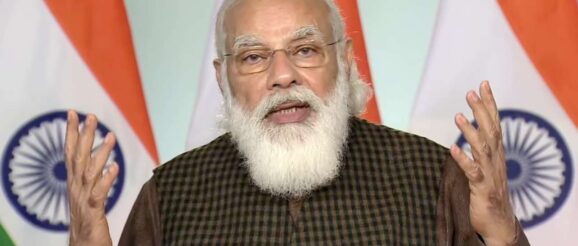Innovation, integrity, inclusion key mantras in management field: PM Modi at IIM Sambalpur

The Indian Institutes of Management (IIM) can act as a bridge between local products and global collaborations, said Prime Minister Narendra Modi on Saturday.
Laying the foundation stone for the permanent campus of IIM-Sambalpur, Odisha through video conferencing, PM Modi said, “Our IIMs can act as a bridge between local products and global collaborations. Innovation, integrity and inclusiveness are the mantras for IIM Sambalpur which can help the country achieve the goal of Atmanirbhar Bharat”.
The prime minister said the goal of a self-reliant India will be achieved with the help of collaborative, innovative and transformative concepts in management.
The Prime Minister further stated that the location is perfect to become an educational hub, with many institutes and colleges already existing in Sambalpur.
“Hirakud Dam, Debrigarh Sanctuary and Sambalpuri textile are giving a new edge to the tourism of Odisha. This entire region is surrounded by small industries and this is like a living laboratory to promote vocal for local,” said PM Modi.
Sambalpur and its neighbouring areas are known for mineral, coal, gold and various gemstones and it is India’s hub of natural assets, he added.
“Innovative ideas from youth will make the region of Sambalpur a great tourist destination in the future. I am confident our IIMs will power local for global with their alumni networks,” said PM Modi.
“Additive printing and 3D printing are giving a new edge to the industrial production of our country. Digital connectivity has changed the world from a global village to a global workplace,” said PM Modi.
Noting that technology is reducing distances between regions, Modi said India has brought speedy reforms in the digital connectivity sector in order to cope with changes taking places all over the world.
“Technology management is as important as human management,” he said, adding the country has been able to build substantial capacity over the last decade which was evident during the COVID-19 crisis.
The permanent campus of IIM Sambalpur will represent the great heritage of Odisha, the Prime Minister stated. “Today’s startups are the multinational companies of tomorrow. Most startups are coming up in tier II and III cities of the country. From the farming sector to the space sector, the scope for startups is increasing,” he added.
Emphasising that the young generation should take along those lagging behind to ensure inclusive growth, Modi said local products will have global reach with the help of new management concepts and techniques.
“Today’s start-ups in India are tomorrow’s Multinational Corporations,” he said, and asked young managers to align their career goals to the aspirations of the country.
Emphasising on how opportunities give rise to permanent solutions, he exemplified that due to the COVID-19-induced pandemic situation, India started manufacturing PPE kits and masks in large scale.
“We have innovated and found long-term solutions. Management is not about managing large companies, it is about managing opportunities in real life,” said PM Modi.
“Centre has worked on a permanent solution for household gas coverage and covered 98 per cent of the nation, the Prime Minister stated. “We also commissioned 10,000 new gas distributors,” he added.
Present on the occasion, Chief Minister Naveen Patnaik said, set up in 2015, IIM Sambalpur has already proved its mettle.
“I am delighted that the Prime Minister is laying the foundation stone for infrastructural development of IIM Sambalpur. In just about five years it (IIM Sambalpur) has been able to cast its positive impact upon the hierarchy of educational institutions in Odisha,” said Patnaik.
PM Modi said IIM Sambalpur will go a long way in giving Odisha a new identity in the field of management education apart from creating tremendous opportunities for the handloom and other sectors in the region.
According to an official statement, IIM Sambalpur is the first IIM to implement the idea of the flipped classroom where the basic concepts are learnt in digital mode and experiential learning takes place in the class, through live projects from the industry.
(With agency inputs)
